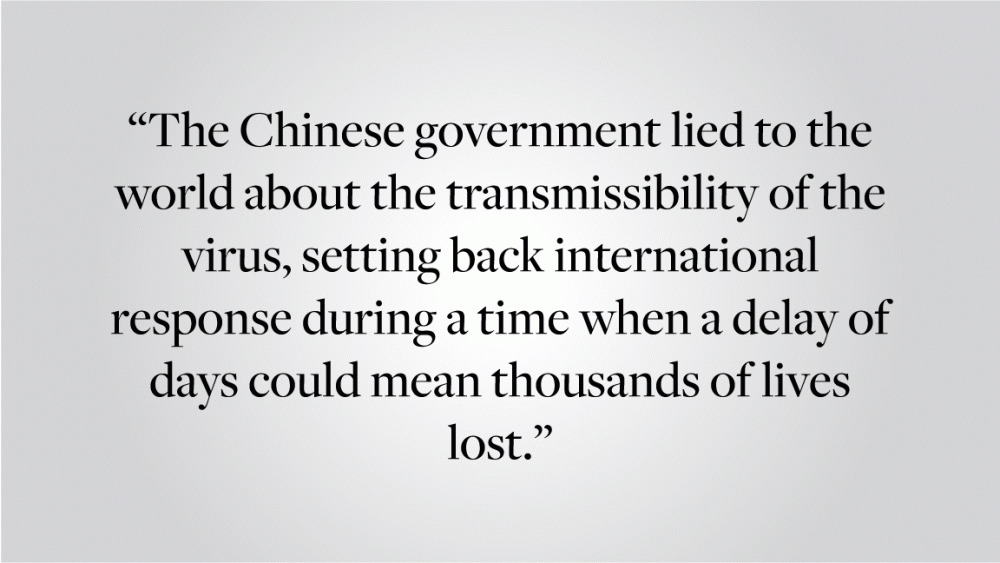As COVID-19 challenges the United States with the greatest health crisis in recent history, many American news outlets have devoted a worrying amount of coverage to bickering over what to call the virus. Of course, President Donald Trump has come under fire for using — but later retracting — the phrase "Chinese Virus," which critics have dubbed racist and xenophobic. Some of the president's most vocal critics have even taken to calling it the "Trumpvirus," arguing that the president deserves blame for the virus' spread in the United States. But the president's controversial word choice should not be conflated with legitimate criticism of the Chinese government for its role in worsening the COVID-19 crisis. In fact, whatever blame Trump deserves for the disease's spread pales in comparison to that of the Chinese government. The lies and deception of the Chinese Communist Party (CCP) regarding COVID-19 have undoubtedly caused the deaths of thousands worldwide, and there is no clearer direction to point the finger than squarely at Chinese president Xi Jinping and his regime.
I understand why many will be hesitant to assign as much blame to the Chinese leadership as I have. China, being the birthplace of the outbreak and the most populous country on earth, has reported low infection and death rates. The United States, meanwhile, leads the world in coronavirus cases. How can I blame the CCP given the seemingly good job it has done limiting the virus' spread?
For starters, any foreign policy expert worth their salt understands that the CCP has little incentive to report accurate information if doing so would damage the regime. Further, cremation data collected by independent Chinese journalists suggests that the CCP may be understating its numbers by as much as 15 to 40 times. But even if you do believe the reported numbers, that doesn't change the fact that the Chinese government lied to the world about the transmissibility of the virus, setting back international response during a time when a delay of days could mean the loss of thousands more lives.
The CCP's deception in this regard could literally not have been worse, as evidence of human-to-human transmission of the virus was apparent from the start. On Dec. 1, 2019, doctors in Wuhan, China, identified symptoms of what would be the first known case of COVID-19. Just a few days later, the patient's wife was hospitalized with flu-like symptoms, later testing positive for the virus. But it would not be reasonable to expect China to sound the alarm so early. Unfortunately, the situation only worsened. In late December, two doctors in Wuhan hospitals were isolated with severe flu-like symptoms. Both would later test positive for COVID-19. Almost immediately, Dr. Li Wenliang sounded the alarm for a possible deadly contagion with human transmission taking hold in Wuhan. The CCP, of course, responded by arresting Dr. Li and forcing him to confess to "spreading false rumors," while continuing to prohibit any Chinese health institution from publishing information about the virus. A full two weeks after this, in mid-January, the World Health Organization parroted the CCP’s lies, tweeting that Chinese investigations uncovered "no clear evidence of human-to-human transmission." It wasn't until late January that Chinese authorities were forced to admit that there was rampant community spread throughout Wuhan.
The evidence is clear. For somewhere between two and six weeks, the CCP knew that a new deadly flu-like viral strain was being transmitted human-to-human in Wuhan. All the while, the government allowed millions to leave the city, stood by as 40,000 families gathered for Lunar New Year celebrations and arrested or even caused the disappearance of doctors who dared speak up. So why, then, were so many Americans put off by President Trump frequently blaming China?
One rather obvious reason is that many saw Trump's renaming of COVID-19 to the "Chinese Virus" as a distraction to some of the failings of his administration, which is certainly a fair criticism. While it is commendable that the president swiftly banned travel from China, about 10 days following the world learning of human-to-human transmission, the White House didn't do much in the month of February to prepare the United States for what was to come. However, it is worth noting that Dr. Anthony Fauci, a member of the president's coronavirus task force, has indicated that Trump never ignored or deferred experts' shutdown recommendations. This may suggest that the delay in the U.S. response was due in part to a lack of information coming from the CCP.
The most polarizing component of the "Chinese Virus" label, though, was the perceived racial implication. Many of President Trump's critics saw the phrase as an attempt to demagogue Chinese Americans and immigrants. The president, however, said he wanted to adopt the name to push back on CCP propaganda, some of which promoted the conspiracy theory that the U.S. military released COVID-19 to the public.
Both of the above concerns are valid, and perhaps the phrase that best satisfies them is a new label: the "Chinese Communist Party Virus." This renaming recognizes the fact that the CCP is responsible for a sizable portion of the spread of COVID-19, while being conscious that the virus is no product of any racial or ethnic group. We must all acknowledge and condemn the role of the CCP in allowing this devastating virus to spread.
Donnie Sahyouni ’21 can be reached at donnie_sahyouni@brown.edu. Please send responses to this opinion to letters@browndailyherald.com and op-eds to opinions@browndailyherald.com.

ADVERTISEMENT




